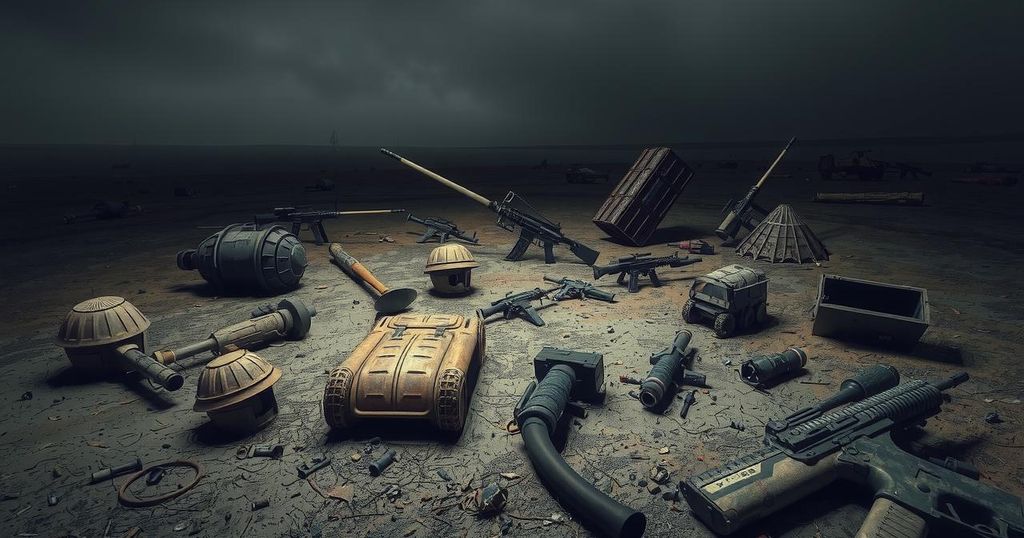The report outlines the grave situation of child soldiers in Sudan due to the ongoing conflict between the RSF and SAF, which has resulted in significant fatalities and displacements. It highlights the recruitment of child soldiers, the psychological effects of such recruitment, and the legal frameworks violated by these practices. Genocide Watch calls for international intervention and the protection of children within this humanitarian crisis.
The ongoing armed conflict in Sudan between the Rapid Support Forces (RSF) and the Sudanese Armed Forces (SAF) has resulted in a catastrophic humanitarian crisis since April 2023. This brutal power struggle has claimed over 60,000 lives and displaced millions of individuals. Currently, more than 30 million people in Sudan require humanitarian assistance due to the extensive disruption caused by the fighting.
A significant consequence of the conflict is the severe child protection crisis, with over 10 million children exposed to extreme violence and trauma instigated by the indiscriminate attacks on civilians. Many children have tragically witnessed the loss of family, destruction of homes, and widespread massacres, with disturbing reports indicating that more than 200 children have been sexually assaulted during this turmoil.
In this perilous environment, children are increasingly at risk of being targeted by organized criminal gangs or recruited into armed factions. A child soldier is generally defined as an individual under 18 years of age engaging directly or indirectly in armed conflict. Reports reveal that both the RSF and SAF have actively enlisted children, with evidence of this being shared on social media platforms.
The UN Special Rapporteur on trafficking in persons, Siobhán Mullaly, indicated that the RSF specifically targets vulnerable children, including those unaccompanied or impoverished in the outskirts of Khartoum as well as those from specific tribal communities. A staggering report suggested that over 600 child soldiers had been killed or injured during combat in Khartoum in August 2023, with children as young as ten observed wielding firearms.
Various factors contribute to the recruitment of child soldiers in Sudan. While some children are coerced or intimidated into joining, others may feel compelled by dire poverty. In several cases, families may view military recruitment as a potential means of survival, leading parents to encourage their children’s enlistment.
In addition to coercion, the RSF has been reported to incentivize recruitment by offering food and safety in return for a child’s service. UN Special Rapporteur Tomoya Obokata highlighted that such recruitment practices violate international law, constituting forced labor or slavery. Furthermore, local leaders often play a critical role in facilitating recruitment for the RSF, complying with requests from their commanders.
The repercussions of child soldiering are profoundly damaging, as children endure severe psychological and physical trauma. Affected children often face a plethora of mental health challenges, including anxiety, depression, and impulsiveness, significantly complicating their reintegration into society upon escape from armed groups. Legal frameworks exist to protect children in armed conflicts; however, violations persist.
Under international law, the recruitment of children for armed conflict is condemned. The UN Human Rights Council categorically states that child recruitment is a human rights infringement and a criminal act. Moreover, Sudan is a signatory to treaties prohibiting the involvement of children in armed conflict, yet the government, alongside RSF forces, continues to recruit children against these established laws.
Genocide Watch advocates for urgent actions, including the establishment of a Commission of Inquiry by the UN Security Council to investigate ongoing crimes in Sudan. They urge all conflicting parties to safeguard humanitarian operations and call for international actors to enhance efforts to liberate and reintegrate child soldiers into society, complemented by appropriate educational opportunities and support for survivors of sexual violence. Furthermore, it is recommended that a robust UN/AU force be re-authorized to effectively address and prevent further violence in Sudan.
The recruitment of child soldiers in Sudan represents a profound violation of human rights amidst an ongoing humanitarian crisis exacerbated by the conflict between the RSF and SAF. Despite existing legal frameworks protecting children, widespread human rights abuses continue unabated. Urgent international intervention is crucial for addressing this situation, which necessitates the protection of children, support for humanitarian efforts, and reintegration programs for formerly associated child soldiers. Collective efforts are imperative to stop these atrocities and safeguard the future of vulnerable children in Sudan.
Original Source: www.genocidewatch.com




